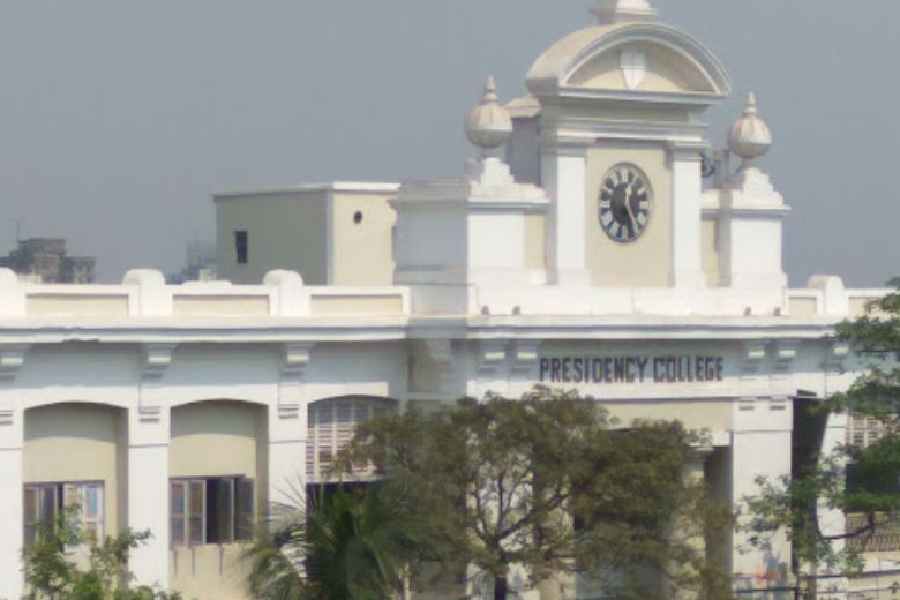Retired Justice Subhra Kamal Mukherjee looks forward to his donning the additional role as officiating vice chancellor of Presidency University with an “open mind”, his unpleasant stint with the Rabindra Bharati University so far notwithstanding. But students of the institution aren’t as upbeat.
“It’s too early to comment on how things would be like at Presidency or whether it would be a re-run of my experiences at RBU unless I begin work there. I look forward to the responsibility with an open mind,” the former chief judge of the Karnataka High Court told The Telegraph Online on a day the state government lashed out at Governor CV Ananda Bose for entrusting Mukherjee with the additional role of officiating vice chancellor at Presidency University besides RBU and for making similar appointments at several state-run universities late on Sunday night.
Two months into his tenure as the interim VC of RBU and Mukherjee is already in a collision course with the Trinamul Congress-backed employees’ federation at the university forcing him to stop attending office on campus and work from home. “I will start working out of the campus soon, possibly inside the next 48 hours,” the former chief judge said.
“I think what happened to me at RBU was unfortunate. Our appointments have been challenged by the state before the Supreme Court which will hear the matter next on September 15. Let’s see what happens there before I figure out the boundaries of my authority. We will have to try our best for the development of the state’s higher education, but right now things are a bit uncertain,” Mukherjee said a couple of hours before formally taking interim charge of Presidency University where the vice chancellor’s chair remained vacant for nearly a year.
Students, though, lacked enthusiasm in their welcome of the incumbent. “We find this yet another plot of the Centre to demean the autonomy of the institution,” said Anandarupa Dhar, a first year MSc student of the university and president of the Presidency University unit of the Students Federation of India (SFI). “The appointment wasn’t in accordance with UGC guidelines and we see this as a means to impose the Centre’s political will from above which jeopardizes the institution’s autonomy,” she explained.
Asked what her first expectation would be from the new vice chancellor, Dhar said: “The university has been without a students union for the last four years. We expect our VC to conduct student elections at the earliest.”
Dhar maintained she followed the developments at RBU and the fallout Mukherjee has had with the employees because he felt campus discipline was at stake. “In Presidency, we maintain a disciplined political environment. The students here are aware of their academic needs and are vocal about matters concerning the society at large. But if, in the name of enforcing campus discipline, the incumbent VC tries to curb political activities then it’s very likely that there would be backlash from students,” she said.
Interestingly the Independents Consolidation, the institution rival of the left wing students Dhar represents, echoed similar views. “Currently, we are not looking at this appointment in a positive light,” Atri Deb Chowdhury, an IC activist who graduated from the university and is seeking admission to the Masters course, said. “We are wary of the fact that the incumbent VC, though a luminary in his own field of work, hardly has the academic qualification to head a university. I’m afraid I am not able to have a blind faith in him and in matters of academics his actions would have to be taken with a pinch of salt,” he continued.
“We have seen in the past that vice chancellors who have maintained close associations with the ruling political powers were reluctant to give importance to the voices of students. Their unilateral decisions were duly countered by the students because we feel we are among the most important stakeholders of our institution and opinions of others can at times be secondary to those of the students,” Chowdhury summarized.
The former chief justice, though, was scathing in his criticism of the role of students in the aftermath of the Jadavpur University suspected ragging death. “How can students have any say on where authorities decide to set up CCTV cameras?,” Mukherjee questioned. “How can students who justify consumption of alcohol inside the campus go unpunished?” his exasperation was apparent.
“The doors of negotiation, dialogue and interactions should always remain open between students and the authorities. If that space of engagement withers away, there will be resistance,” Chowdhury maintained.











